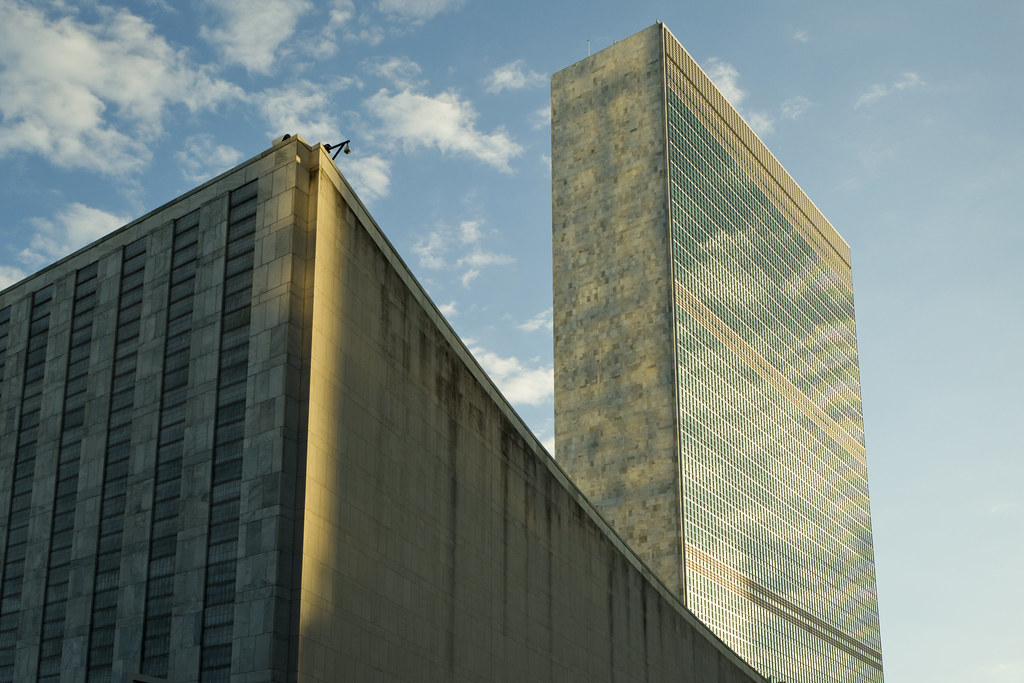U.N. Security Council Resolution on Protecting People With Disabilities in Armed Conflict
On June 20, the United Nations Security Council passed a unanimous resolution to protect people with disabilities in armed conflict and ensure they have equal access to humanitarian assistance. The groundbreaking text follows extensive advocacy from civil society and disability rights groups, and marks the first time the council has dedicated an entire resolution to the unique challenges people with disabilities face during situations of armed conflict.

Published by The Lawfare Institute
in Cooperation With

On June 20, the United Nations Security Council passed a unanimous resolution to protect people with disabilities in armed conflict and ensure they have equal access to humanitarian assistance. The groundbreaking text follows extensive advocacy from civil society and disability rights groups, and marks the first time the council has dedicated an entire resolution to the unique challenges people with disabilities face during situations of armed conflict. Although the impact of the resolution will depend on implementation, it should lead to increased data collection on people with disabilities in the aftermath of armed conflict and provide them a voice in decisions regarding humanitarian action.
According to the World Health Organization, more than one billion people—or 15 percent of the world’s population—have some form of disability. Of these, an estimated 9.7 million have been forcibly displaced as a result of conflict and persecution. During armed conflict and other humanitarian emergencies, people with disabilities face unique risks—including abandonment by family members and difficulties accessing basic humanitarian services such as food, sanitation and medical assistance. Children with disabilities also face barriers to attending school on an equal basis with other children.
In the wake of armed groups’ attacks on communities in the Central African Republic starting in 2013, for example, Human Rights Watch has documented that at least 96 people with disabilities had been abandoned or were unable to escape when their homes came under attack; 11 were killed. In one case, the organization found 17 people with disabilities left behind after 1,500 survivors fled the city of Bossemptélé. Moreover, in the Central African Republic, Yemen, Iraq, Greece, Lebanon, Myanmar and South Sudan, people with disabilities described difficulties navigating uneven terrain to access food and medical supplies.
Resolution 2475, passed by the Security Council, addresses many of these challenges by urging all parties to armed conflict to prevent violence and abuses against civilians—including those with disabilities. Moreover, the resolution emphasizes the need for states to end impunity for criminal acts against civilians, including those with disabilities, and to ensure that civilians have access to justice and effective remedies. The council further called upon all parties to armed conflict to allow and facilitate safe, timely and unimpeded humanitarian access.
In addition, among other measures, the resolution pushes for increased capacity building and data collection on people with disabilities. Specifically, it “urge[s] Member States to enable the meaningful participation and representation of persons with disabilities, including their representative organizations, in humanitarian action, conflict prevention, resolution, reconciliation, reconstruction and peacebuilding[] ...” and “[r]equest[s] the Secretary-General to include ... where pertinent, data disaggregated by disability within existing mandates and within existing resources.”
Finally, the resolution urges states to comply with their obligations under the United Nations Convention on the Rights of Persons with Disabilities, which 161 states have joined. Article 11 of the convention requires states to “take, in accordance with their obligations under international law, including international humanitarian law and international human rights law, all necessary measures to ensure the protection and safety of persons with disabilities in situations of risk, including situations of armed conflict, humanitarian emergencies and the occurrence of natural disasters.”
Though the resolution passed unanimously, some permanent members of the Security Council expressed caution about creating new legal obligations under international law and exceeding the scope of the council’s mandate. Gennady V. Kuzmin of the Russian Federation noted that Russia “share[s] humanistic principles and tasks to alleviate the plight of persons with disabilities in conflict” but “firmly uphold[s] our position that all social groups should be equally protected during armed conflict as stipulated by the international law. Specific needs of one category of population should not come at the cost of and with prejudice to another category.” The council, Kuzmin explained, “should not invent any new international legal concepts that are allegedly aimed to fill ‘gaps’ in the protection regime established by the Geneva Conventions” and not “get too preoccupied with devising new categories of individuals who should need specific protection under the international humanitarian law.”
Likewise, Yao Shaojun of the People’s Republic of China added that the issue of people with disabilities “should be dealt with in full observance of all Council resolutions on the protection of civilians” and that “the countries concerned must shoulder the primary responsibility of assisting such persons, with the United Nations and others playing a complementary role.”
Russia is correct that Resolution 2475 does not appear to create any new legal obligations for member states. While Article 25 of the U.N. Charter obligates U.N. member states to “accept and carry out the decisions of the Security Council[,]” there is no clear consensus about what type of language indicates that a provision in a Security Council resolution is intended to be obligatory. Instead, as the International Court of Justice explained in its 1971 Namibia Advisory Opinion, this requires careful analysis of the provision in context:
The language of a resolution of the Security Council should be carefully analysed before a conclusion can be made as to its binding effect. In view of the nature of the powers under Article 25, the question whether they have been in fact exercised is to be determined in each case, having regard to the terms of the resolution to be interpreted, the discussions leading to it, the Charter provisions invoked and, in general, all circumstances that might assist in determining the legal consequences of the resolution of the Security Council.
As John Bellinger, the former legal adviser for the U.S. Department of State, has explained, many contemporary international lawyers have settled on the use of three factors to indicate that a particular Security Council resolution is intended to be binding: (1) a “finding that there is a ‘threat to international peace and security’[,]” (2) a statement that the Security Council is “‘acting under Chapter VII’ of the UN Charter[,]” and (3) the “use of the verb ‘Decides’ in any operative paragraphs intended to be binding[.]” Resolution 2475, however, contains none of these. To the contrary, the resolution’s operative provisions all use verbs such as “urges,” “emphasizes,” “requests” and “calls upon”—language that, as Dan Joyner has explained, generally, but not always, indicates the intent that a provision should be nonbinding.
Nonetheless, Resolution 2475 could inform how the Security Council drafts future resolutions authorizing peacekeeping operations, which often fall under Chapter VII authority. For instance, in Resolution 2459, which extends the mandate of the United Nations Mission in the Republic of South Sudan (UNMISS) and invokes Chapter VII authority, the council expressed serious concern “about the dire situation of persons with disabilities in South Sudan, including abandonment, violence and lack of access to basic services” and emphasized “the need to ensure that the particular needs of persons with disabilities are addressed in the humanitarian response.” The language appears in a preambular paragraph and is nonbinding. However, Resolution 2475 builds a foundation for the Security Council to include additional language about protection of people with disabilities in future peacekeeping resolutions.
Resolution 2475 comes after extensive engagement from civil society and disability rights groups over the past six months. On Dec. 3, 2018, the Security Council held an informal Arria Formula meeting on the “Situation of Persons with Disabilities in Armed Conflict” sponsored by Poland, in partnership with Côte d’Ivoire, Germany, Kuwait and Peru, and with the cooperation of the United Nations Office of the High Commissioner for Human Rights (OHCHR), the United Nations International Children’s Emergency Fund (UNICEF) and the International Disability Alliance. On April 24, Nujeen Mustafa, a Syrian activist who has cerebral palsy and uses a wheelchair, described her journey as a refugee fleeing from Syria to Germany. Mustafa was the first woman with a disability to brief the Security Council.
While many of Resolution 2475’s goals are remote and lofty, the Security Council has taken an important step in engaging with a group of individuals who are often forgotten in armed conflict and humanitarian emergencies. The resolution provides a mandate and spotlight for more inclusive humanitarian action.





